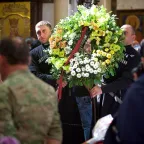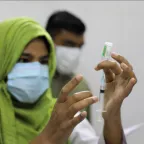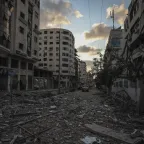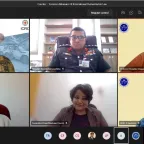"People deserve to rest in peace - it matters"
What responsibility do we have to the dead? An ICRC forensic specialist reflects on this sometimes harrowing but always meaningful area of work. Oran Finegan recently left his role as head of the …
What responsibility do we have to the dead? An ICRC forensic specialist reflects on this sometimes harrowing but always meaningful area of work. Oran Finegan recently left his role as head of the …

The following statement can be attributed to the President of the International Federation of Red Cross and Red Crescent Societies, Francesco Rocca, and to the President of the International …

Ene Abah reports from CAR*. The people around me filled their plates with towering piles of food. I noticed how much they were eating and asked them about it. Their responses were striking: They …

Armed conflicts feature an ever-growing number of actors organized in overlapping webs of alliances, proxy dynamics and other types of support relationships. And when armed actors fight alongside …
Humanitarian crises, including pandemics, often result in large-scale fatalities with many deceased going unidentified because of improper or undignified management of the dead. But an individual has …

Jakarta (ICRC) – In support of strengthening the capacity of the Indonesian Red Cross (Palang Merah Indonesia/PMI) at the provincial and district level, the International Committee of the Red Cross …

19-05-2021 Geneva (ICRC) – In an ideal world, health-care workers who risk their lives to save others would have just as many supporters as footballers. Unfortunately, that’s far from the reality. …

A statement in the name of Fabrizio Carboni, ICRC Near and Middle East Director. "People in Gaza and Israel urgently need respite from non-stop hostilities, as we enter the second week of airstrikes …

International humanitarian law is the set of rules which, in times of war, protect those who are not, or no longer, taking an active part in hostilities, and limit the choice of methods and means …
The Geneva Conventions enjoy universal acceptance, even seven decades after their adoption. Their integration into domestic law and military doctrine continues to prevent and minimize the human cost …

Try one of the following resources:
Created in 1863, the ICRC library, alongside the ICRC archives, provides an indispensable documentary reference on the organization itself and international humanitarian law.
International humanitarian law is based on a number of treaties, in particular the Geneva Conventions of 1949 and their Additional Protocols, and a series of other instruments.
Customary international humanitarian law consists of rules that come from "a general practice accepted as law" and that exist independent of treaty law.